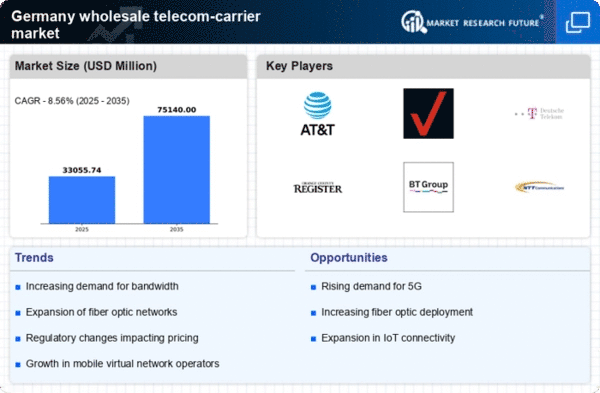Growing Demand for IoT Connectivity
The increasing proliferation of Internet of Things (IoT) devices is a critical driver for the wholesale telecom-carrier market in Germany. As of 2025, it is estimated that there will be over 1 billion connected IoT devices in the country, creating a substantial demand for robust connectivity solutions. This surge in IoT adoption is prompting carriers to enhance their infrastructure to support the massive data traffic generated by these devices. The wholesale telecom-carrier market is likely to benefit from this trend, as carriers seek to provide specialized services tailored to IoT applications, such as low-power wide-area networks (LPWAN). This shift not only opens new revenue streams for carriers but also fosters innovation in sectors like smart cities, healthcare, and industrial automation.
Increased Focus on Cybersecurity Solutions
As the wholesale telecom-carrier market in Germany evolves, the emphasis on cybersecurity is becoming increasingly pronounced. With the rise in cyber threats and data breaches, carriers are compelled to invest in robust security measures to protect their networks and customers. In 2025, it is anticipated that spending on cybersecurity solutions within the telecom sector will reach approximately €2 billion, reflecting a growing recognition of the importance of safeguarding sensitive data. This heightened focus on cybersecurity is likely to drive collaboration between telecom carriers and cybersecurity firms, leading to the development of comprehensive security solutions. Consequently, this trend may enhance the overall resilience of the wholesale telecom-carrier market, instilling greater confidence among businesses and consumers alike.
Rising Demand for Wholesale Services from MVNOs
The wholesale telecom-carrier market in Germany is witnessing a surge in demand for wholesale services from Mobile Virtual Network Operators (MVNOs). As of 2025, the number of MVNOs operating in Germany is projected to exceed 100, reflecting a growing trend among businesses to enter the telecom sector without investing in their own infrastructure. This trend is likely to drive competition within the wholesale telecom-carrier market, as carriers seek to provide attractive wholesale pricing and flexible service agreements to attract MVNOs. The increasing reliance on MVNOs for mobile services is expected to create new revenue opportunities for carriers, while also enhancing consumer choice and driving innovation in service delivery.
Regulatory Support for Infrastructure Investment
The regulatory landscape in Germany is increasingly supportive of infrastructure investment, which serves as a vital driver for the wholesale telecom-carrier market. Recent policies aimed at promoting digitalization and enhancing connectivity are encouraging carriers to invest in next-generation networks. The German government has set ambitious targets to achieve nationwide gigabit connectivity by 2025, which is likely to stimulate significant investments in fiber-optic infrastructure. This regulatory support not only facilitates the expansion of network coverage but also fosters competition among carriers, ultimately benefiting consumers. As carriers respond to these regulatory incentives, the wholesale telecom-carrier market is expected to witness enhanced service offerings and improved network reliability.
Technological Advancements in Network Infrastructure
The wholesale telecom-carrier market in Germany is experiencing a notable transformation due to rapid technological advancements in network infrastructure. Innovations such as 5G technology and fiber-optic networks are enhancing connectivity and capacity. As of 2025, the deployment of 5G is projected to cover approximately 80% of urban areas, significantly improving data transmission speeds. This shift is likely to attract more businesses seeking reliable and high-speed connectivity solutions. Furthermore, the integration of advanced technologies such as Software-Defined Networking (SDN) and Network Functions Virtualization (NFV) is streamlining operations and reducing costs. Consequently, these advancements are expected to drive competition among carriers, ultimately benefiting the wholesale telecom-carrier market by providing diverse service offerings and improved customer experiences.















Leave a Comment